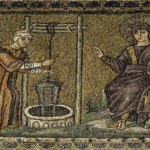We run our website the way we wished the whole internet worked: we provide high quality original content with no ads. We are funded solely by your direct support. Please consider supporting this project.

Why Believe the Virgin Birth Accounts?
Some skeptics claim that the story of the virgin birth of Jesus is derived from similar stories from pagan literature. While I won’t address here the details of the various parallels that some use to argue this point—as it has been demonstrated by many scholars that they simply don’t hold up to scrutiny—I will offer four reasons why I trust that the Bible’s account of the virgin birth is trustworthy and thereby reject this pagan-origin theory as bogus.
- It’s extremely unlikely that the early Christians who were largely first century, orthodox, Palestinian Jews would borrow material from pagan stories. All the historical evidence indicates that Palestinian Jews were strongly resistant to pagan stories and practices.
- Unlike the pagan stories, the accounts that are included in the Gospel were not about someone who lived “once upon a time,” but someone who lived in the very recent past and in the region where the story was originally being told. Even if the earliest Jewish Christians would have been capable of incorporating pagan legends into their proclamation, it’s hard to see how they could have plausibly done this while Jesus’ brother and mother along with others who knew him were still alive. (I would argue that both Matthew and Luke were written prior to 70 AD, but even if one accepts a later dating of 70 to 90 AD this is still very close to the event by historical standards. Plus, we must remember that the Gospel material was passed on and protected orally before being written. On the importance of oral traditions in non-literate cultures, see Eddy, Boyd, The Jesus Legend).
- Unlike any other literature that contains alleged supernatural conceptions, Matthew and especially Luke give us many historical reasons for accepting their general historicity (here too, see The Jesus Legend). The infancy narratives of Jesus in particular bear all the marks of reports that go back to the earliest witnesses.
- The alleged parallels of these pagan stories to the Gospel accounts of Jesus’ conception are simply not very impressive. There are, of course, numerous accounts of gods having sex with each other to produce a divine mythic hero and even some accounts of a male god having intercourse with a woman to produce a partly divine hero. But these supposed parallels actually lack one key thing: virginal conception. The divine or human females had sex! So far as I know, there are three possible exceptions to this (Krishna, Buddha and the son of Zoroaster), but even in these accounts it’s a stretch to say they parallel the Gospel accounts of a seed being created ex nihilo and planted in the womb of a woman who had never had sex. In addition, we have absolutely no historical reasons for thinking any of these accounts is at all rooted in history or that the earliest Christians knew about them – let alone borrowed from them.
Of course, none of this proves that Mary supernaturally conceived Jesus while remaining a virgin. The nature of the subject is that it’s impossible to prove (true or false). And, I should add that my faith in Christ doesn’t hang or fall on the historicity of this particular story. At the same time, I find I have many compelling historical (as well as existential and philosophical) reasons for accepting the general portrait of Jesus in the Gospels, and since the story of Jesus’ virginal conception is part of this broader story, I believe it to be true.
Photo credit: Lawrence OP via Visualhunt.com / CC BY-NC-ND
Category: General
Tags: Apologetics, Jesus, Reliability of the Gospels
Related Reading

The Incarnation: More Than a Rescue Mission
A mistake people often make concerning the Incarnation is that they fail to distinguish the eternal plan of God to unite himself with humanity in Christ, on the one hand, from the atoning significance this plan acquired after the fall, on the other. Some therefore think of the Incarnation as a sort of “Plan B”…

Why the Rapture is a Bad Idea
Is the Rapture really what you think it is? Most Christians believe that God will take his followers up to heaven before the really bad stuff starts on earth, but is this what the bible says? Is this view consistent with the loving God that Jesus shows us in the New Testament? View the full…

The Politics of Jesus
Many are so conditioned by the mindset of the world that they can’t even envision an alternative way of affecting society and politics other than by playing the political game as it is done by the established governmental system. Some thus conclude that, since Jesus didn’t try to overhaul the political systems of his day…

Podcast: What if Science Proved Jesus Did Not Rise From the Dead?
Greg responds to an accusation from Richard Dawkins and considers a hypothetical situation where scientists prove that Jesus did not rise from the dead. He also confesses which worldview he would adopt if he were to leave Christianity. http://traffic.libsyn.com/askgregboyd/Episode_0085.mp3

Benefit of the Doubt Is Here!
Benefit of the Doubt is finally here and you should definitely get yourself a copy! Frank Viola interviewed Greg about the book recently and you can read it over on Frank’s blog Beyond Evangelical. In fact, Frank is so enthusiastic about the book that he added it to his Best 100 Christian Books Ever Written list. Wow. Also,…

Jesus and the “Favored Nation”
Nationalism lies at the heart of the Old Testament narrative. This concept is intimately wrapped up with the law-oriented covenant God made with the Israelites at Mount Sinai, for at the heart of this covenant is the promise that obedience would bring national security while disobedience would bring national disaster (Deut. 27-28). What we shall…
